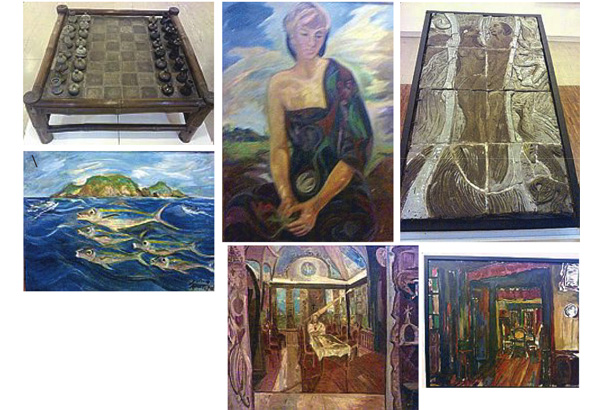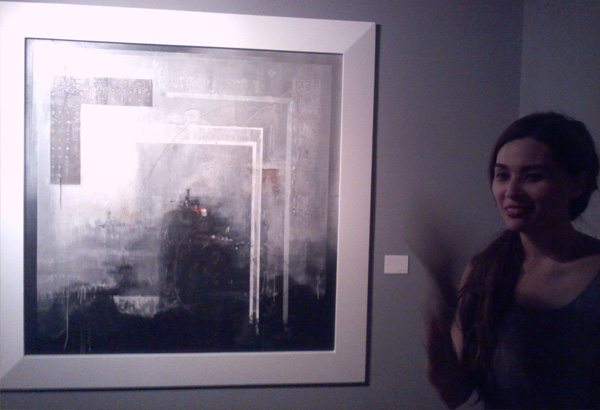Art, where art thou?

From CCP to Old Balara then back again southward to Reposo, art and the semblance of art are alive and well with a kick and a shove in the fiery month of March. The painter Jaime de Guzman, who we first came across in a poem by Alfred Yuson (“Anne, Jaime’s wife, says Quiapo is the country’s armpit” from “Living, dreaming, dying”), is having a retrospective exhibit at the Cultural Center off Vito Cruz in Pasay. And it’s only fitting that it is Yuson who writes the exhibit notes.
Astounding are the old works where they inhabit the Bulwagang Juan Luna, breathe a life of their own in the gallery. There’s a sculpted chess set that aficionados of the game would love, could indeed inspire them to think up new zugzwang combinations. A found jigsaw sculpture, too, reclining on floor as if an ancient relic, perhaps a local version of Isis and Osiris.

Artworks by Jaime de Guzman: a chess set, a portrait of wife Anne, “Coupled in Stone,” “Apo Island,” “Christ waiting for His Apostles at Last Supper Table,” and “Dining Room in an Old House”
There are various expressionist and post-surreal renderings of his travels in the islands in the ’60s and ’70s, off Apo Island, a dining room in an old house, the Cebu waterfront, and of course Anne but not what she thinks of Quiapo, then back to the room where the painter was born that has largely remained unchanged. Christ, too, is waiting for his apostles at the dinner table, and a hurried self-portrait in charcoal just to get it over and done with.
What a wonderful bohemia, and there were skulls, too, in pop art unimposing style long before the present purveyors of skulls were born. The whole troop came in full force that night, from Sylvia and Barang to Adi and Bogie, what a one to remember to mark another chapter in our vagabond lives of no direction home.
The recent paintings are set mainly in Candelaria, the artist back to his roots in the wilds of Quezon. Brighter colors, too, as if light were again discovered by the ever-seeing eye. Mythic creation rising out of the void, and to think that it all began with a line from a poem about living, dreaming, dying.
Nearly on the other side of town, meanwhile, at the Erehwon Center for the Arts in old Balara a group of mostly social realists worked on a mural on the SAF 44, detailed faithful renditions of each special police who died in that now-infamous encounter in Mamasapano, Maguindanao last January.
“The important thing is that the relatives recognize their slain kin,” says Dario Noche, center resident artist and one of the painters of the mural. Others with their paintbrushes beside photos of the heroic dead are Neil Doloricon, Grandier Bella and Eghai Roxas.

Beatrix Syjuco with “Night Moves,” acrylic on canvas
The mural was unveiled on the 40th day after the massacre, and will hang permanently at the police academy in Silang, Cavite, birthplace of heroes if one is to be thoroughly rightist about it.
Then back south to Reposo across Alliance Française, in the LRA Design Building there’s an exhibit of acrylic paintings by Beatrix Syjuco, “An Unfair Vanity.” Again the troops were out in full force, from Achacruz to Rayvi, Maxine Magoo and Cesare and Jean Marie, Krip as well, then later when the night jammed down, Eghai took to the skins and Hermisanto rendered some growling blues vocals between takes on a trusty harmonica, while Orville Tiamson did subtle atmospheric lines on guitar.
But one must take a close look at the paintings themselves, which may fool you as being plainly abstract. Not so, as any trick of the eye will tell you. Fairly large-scale and done in predominantly white and gray among other pastels, the paintings are tangential statements of how art moves with the night, running with the beasts of memory and the imagination.
To see things unseen like the blazing wildfire of a poem’s refraction. And how all is myth and wonder and the remains of modern music.















